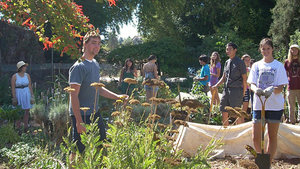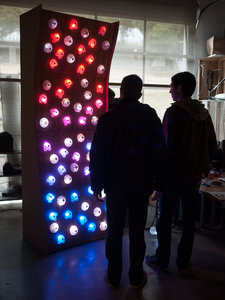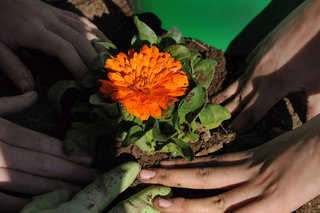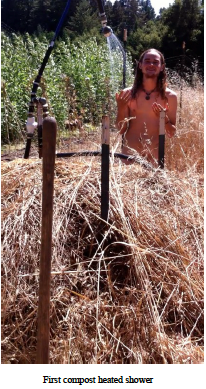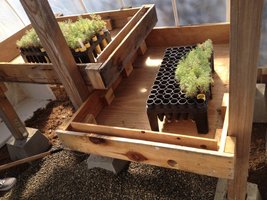Projects Funded in 2013-2014
Brain Mind and Consciousness Conference (BMC^2) GRoW: Global Roots of Wellness
Allocated Funds: $300.00
Purpose: The Brain, Mind & Consciousness (BMC) Society is an interdisciplinary student organization committed to student directed education and exploration of human cognition, behavior, and experience and their applications toward a just and sustainable future. The purpose of BMC^2 is to educate, connect and activate students and community members towards creating innovative sustainable solutions through an interdisciplinary approach. In June 2014, BMC held a three-day conference which created a space for students and community members to plan and explore projects related to those topics. It was a zero-waste event with compostable dishes and silverware; as well as local and organic food and a bike power generator.
Village Compost Program
Allocated Funds: $300.00
Purpose: The Program in Community and Agroecology (PICA) is a residential community located in the Village that provides educational opportunities for the entire campus community. Through weekly student-led workdays and workshops at PICA, UCSC students are able to gain the hands on experience in organic gardening and sustainable living skills. The Village Compost Program would help in contributing to the overall goal of Zero Waste by 2020 by diverting hundreds of pounds of Village residents’ food waste annually and recycling it back into the PICA gardens. The Village Compost Program will further the Carbon Fund’s mission to support a sustainable future by reducing greenhouse gas emissions and by implementing an educational behavior-change program that will teach students about how to divert their food waste.

Financial Affairs Year In Waste Programming
Allocated Funds: $450.00
Purpose: The Financial Affairs Year In Waste programming included waste reduction activities through educational workshops, equipment, and division wide events for the Financial Affairs Department. Specifically, there were a total of 3 one hour long presentations based around waste reduction with an eye to sub themes of worm composting, preparing green lunches, and e-waste/and or paper towel usage and hand washing. Additionally, grant funds went towards supplies including but not limited to purchasing a worm bin with the specific purpose of composting paper towels; and purchasing reusable hand towels for “Bring Your Hand Towel to Work Week.”
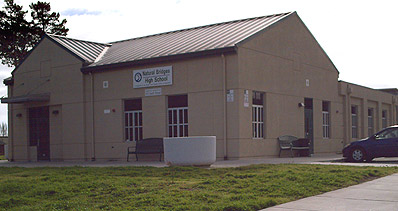
Passive Solar Utilization at Natural Bridges Green Center School
Allocated Funds: $560.00
Purpose: The Natural Bridges Solar Tube (NBST) team plans to install tubular skylights known as solar tubes at Natural Bridges Green School (NBGS). The NBST team believe that providing natural lighting in the classroom will enhance student learning while reducing energy usage. Concurrent with the physical installation portion of the project, the NBST team will also teach a curriculum based on passive solar design and green building principles to the students at NBGS.

Green Labs Certification Program
Allocated Funds: $1,500.00
Purpose: The Green Labs Committee monitors the energy usage statistics in both individual labs and the six laboratory buildings more generally to determine the efficacy of energy conservation programs. Once laboratory personnel are made aware of their actual energy consumption, it is very likely that they will do more to conserve electricity. Such efforts toward energy conservation will directly decrease the amounts of greenhouse gasses emitted at UC Santa Cruz.

Retrofitting Kresge Natural Foods Cooperative
Allocated Funds: $1,900.00
Purpose: The Kresge Natural Foods Cooperative serves over 500 Kresge Students, other campus students, staff and faculty with an affordable, on-campus option of access to local, organic food. They have replaced their outdated freezer with an Energy Star operating, upright freezer. A new freezer will save about 200 kWh of electricity per year than the old freezer. The second component of the project is to buy reusable bulk storage bins for their back stocked bulk inventory, which would allow for a significant reduction in wasted product due to mold or infestation.
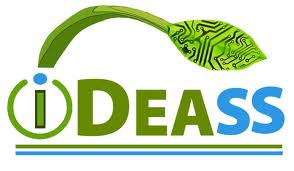
Mobile Recharging Station
Allocated Funds: $2,500.00
Purpose: This project focuses on designing and building of a mobile battery recharging station powered by self-tracking solar photovoltaic panels for UCSC grounds services. This will be a robust, weather-proof system capable of charging a wide array of batteries while having the ability to be operated by someone without a high level of technical understanding. These battery recharging stations may accommodate several uses in many departments across campus, based on the individual needs of each department in the future. The central focus of the design is to create an adaptable system that can utilize many PV configurations in combination with constantly changing battery technology without the need to change internal circuitry or software.

Monterey Bay Carbon Fund—Solar For Schools Initiative
Allocated Funds: $2,500.00
Purpose: The goal of the proposed project is to catalyze the next phase of MBCF Solar for Schools installations by harnessing UCSC seed funding to generate “panel-ready” projects poised to reduce GHG emissions, create green jobs, reinvest in the local community, and stimulate behavior change for a sustainable future. MBCF has already successfully installed solar panels on Bonny Doon Elementary School in collaboration with Cabrillo College students interested in gaining hands-on green job workforce training.
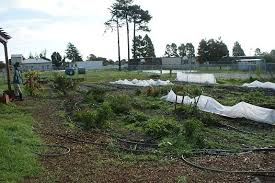
Completion of Rainwater Catchment and Implementation of Smart Farm Irrigation System
Allocated Funds: $2,506.00
Purpose: The IDEASS team taught students from NBHS about the importance of water conservation while also helping to prepare students for potential jobs in a green career. Students from NBHS were educated on environmental issues, project planning, as well as gaining hands-on construction experience. Together they installed water flow meters on both the intake and outflow of the school’s rainwater storage tanks in order to get the precise number of gallons collected and used.
Oceanic Scales
Allocated Funds: $3,300.00
Purpose: Oceanic Scales educates the public about the importance of maintaining a stable ocean ecology, as phytoplankton are responsible for half the world’s fresh oxygen, 1/3rd to ½ of the world’s carbon sequestration and are the first link in the oceanic food chain/web. This art and science exhibit/installation will inspire it’s participants to think differently about their day to day actions and choices that add up to a healthier planet. An interdisciplinary team of faculty and students from Digital Arts & New Media, Film & Digital Media, Marine Biology, Ecology, Computer Science and Engineering at UCSC are coming together to make this idea possible.
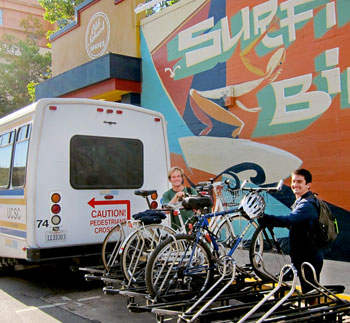
UCSC Transit System EV Conversion Feasibility Study
Allocated Funds: $3,600.00
Purpose: Ronnie and students will conduct a feasibility study of a phased conversion of the current campus shuttle and vanpool system from gasoline and diesel to electric vehicles recharged by a campus solar PV system. Because the fleet vehicles must be replaced at the end of their useful lifetimes, an analysis of the costs, benefits and possibilities of purchasing smaller EV or hybrid vehicles--20 person vehicles and 6-8 person commuter vans--could show significant emission reductions. In combination with (a) a destination-demand system and (b) autonomous vehicles, the fuel use and operating costs of the system might also be significantly reduced.
Bicycle Commuting Workshop Program
Allocated Funds: $4,839.00
Purpose: People Power is seeking a series of bicycle commuting workshops to be held March through July of 2014.These workshops will be available free of charge to community members and cover laws affecting cyclists, riding skills, gear and basic maintenance. Classes will take place in workplaces throughout the County as well as in our office in downtown Santa Cruz. The program will have two components; 10 workplace-sponsored classes and 5 regularly scheduled community classes, for a total of 15 courses. Community classes will take place one evening per month at the People Power office, which is centrally located in downtown Santa Cruz.
Harbor High Grow Quad
Allocated Funds: $5,000.00
Purpose: Grow Quad is a 1/10th acre edible forest commons in its early stages of development. Located in a central space on Harbor High School campus, it will be an inviting space which serves to educate students and members of the community around themes of permaculture-guided food production and sustainable life practices.

Monterey Bay Community Power
Allocated Funds: $5,000.00
Purpose: Monterey Bay Community Power (MBCP) is a public/private partnership led by Santa Cruz County comprised of 16 counties, cities and special districts, as well as the Community Foundation of Santa Cruz County (CFSCC). The partnership was formed in late 2012 to assess the environmental and economic benefits of creating a regional Community Choice Aggregation (CCA) Joint Powers Authority (JPA) within the greater Monterey region by conducting a Phase 1 Technical Study.
Pathway Lighting
Allocated Funds: $5,000.00
Purpose: This project addresses UCSC’s energy and greenhouse gas (GHG) emission reduction goals by decreasing energy used by campus pathway lights. This project will replace the bulbs that are currently being used in the “lollipop” fixtures to energy-efficient LED light bulbs. This simple, non-invasive retrofit will not only help lower campus energy demands and lighting costs, but the reduced electricity consumption implies reduced carbon emissions associated with power generation.
Compost Heated Water System
Allocated Funds: $7,000.00
Purpose: The purpose of this project is to investigate the possibility of energy production and waste mitigation through compost, as repurposing waste is crucial to fulfilling campus commitments to goals of Zero Waste by 2020. This project explores the possibility of composting woody biomass and other plant debris or “green-waste” in aerobic conditions at high heat, which is then used to heat water for cleaning and washing. The project will be for the CASFS farm on UCSC campus to produce hot water and soil by repurposing “green-waste”. The hot water produced by the composting process would reduce the campus carbon footprint by offsetting fuel or energy traditionally used to heat water.
Green Building Carbon Laboratory
Allocated Funds: $7,000.00
Purpose: Students designed and developed a closed loop organic system to show abundant food production using efficient sustainable aquaculture. In a controlled environment atmosphere, using off grid renewable energy, they show a dramatic reduction in water usage and maximization of organic crop yield. Materials are primarily sourced materials from local companies with reputable track records. The energy is provided by the sun, generated by an integrated photo voltaic cell system. Rainwater harvested from a shed roof will provide a water reserve. The aquaponic reduces water usage and produces food abundance. Further more, the plant life in this greenhouse will serve to sequester carbon. With a holistic systems approach, the purpose is to re-frame the relationship between the built environment and nature.
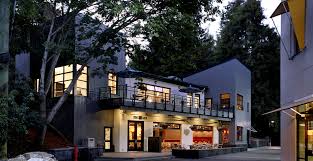
Graduate Student Commons Lighting Retrofit
Allocated Funds: $9,422.60
Purpose: The graduate student commons is a 24-hours facility owned by UCSC Graduate Students. This building provides a space for graduate student meetings, quiet study, and informal gatherings. This building is heavily used by groups during the day, evening, and students throughout the night. Lighting in educational facilities can account for up to 35% of total electricity consumption. According to Physical Plant's audit conducted on 10/22/2013 and subsequent monitoring of lighting usage patterns, it is estimated that the lighting retrofit will reduce electricity usage by about 5,600 kWh or nearly 40% annually.

Agroecological Irrigation Decision Support System
Allocated Funds: $9,990.80
Purpose: This project is designed as a pilot with the scope of improving GHG reduction management at the Center of Agroecology & Food Systems (CAFS) Farm site. To reach this goal, new equipment will be installed to provide accurate control and tracking of water and nutrient inputs, and consequently, the biological, chemical, and physical drivers of GHG emissions. Application of the Agroecological Irrigation Decision Support System will result in 1) Reduced N2O and CO2 emissions, 2) increased water use efficiency, 3)increased nutrient use efficiency, 4)improved crop yields, and 5)reduced unrecycled irrigation material waste (drip tape).
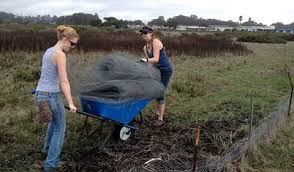
Pedaling Towards Sustainable Stewardship
Allocated Funds: $12,650.00
Purpose: The University of California Natural Reserve System (NRS) is a unique collection of 39 different protected wild land site throughout California. The University of California, Santa Cruz is accountable for four of those sites, spreading 60 miles along the central coast of California. Each reserve has unique research and teaching opportunities. With funding provided by the Carbon Fund, staff and students are able to transport tools and plants around Younger Lagoon Reserve (YLR) using human powered trikes, and making trips between the campus and the reserve using electric bikes, thus greatly reducing YLR's carbon emissions.

Development Pathway For 10 MW of Commercial Solar Deployment
Allocated Funds: $16,500.00
Purpose: With the successful completion of major municipal solar photovoltaic (PV) projects, the City of Santa Cruz has momentum for accelerating development of zero-carbon renewable energy resources. This project includes:(1) providing technical support to 10 commercial property owners to evaluate and make recommendations on appropriately sized PV and energy efficiency retrofit (EE) projects(2) providing property owners with a project design package sufficient to meet the unique needs of each commercial property including bids from solar contractors, and(3) assembling a set of financing options for PV installations on commercial buildings including PACE financing through CaliforniaFIRST. The intended outcome of this project is for at least 5 commercial property owners to utilize the solar characterization and design to install PV and EE retrofits on their property.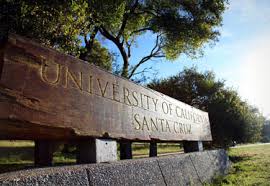
UCSC Climate Sensor Network
Allocated Funds: $18,000.00
Purpose: This project initiates a series of energy and water research initiatives in the Lower Quarry. This project aims to monitor and report the pilot energy and water efficiency installations taken place in the Lower Quarry. Long-term goals of this project include: build and install a network of low cost sensors on campus which can provide real-time data wirelessly, identify energy and water distribution that can provide information for carbon reduction opportunities in the future, establish a baseline for valuable research, and to build experience and capacity among UCSC students as future professionals in sustainability-related fields.
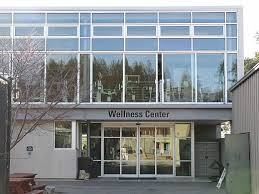
Wellness Center Rainwater Harvesting System
Allocated Funds: $25,000.00
Purpose: This project aims to monitor and determine the overall effectiveness of rainwater harvesting re-use use at the educational/industrial facility and provide a working prototype for future rainwater catchment systems. This project also seeks to educate the campus community about the several aspects involved in the implementation of the rainwater catchment systems. This project will provide both economic and environmental benefits to UCSC. The cost of portable water is expected to increase, by using rainwater catchment systems we are decreasing the demand for transported water and using recycled rainwater to flush our toilets.

